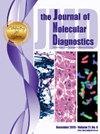一种无创多组学方法在回顾性和前瞻性队列中用于多种癌症早期检测的临床验证。
IF 3.4
3区 医学
Q1 PATHOLOGY
引用次数: 0
摘要
最近的研究强调了基于血液的多癌早期检测(MCED)检测在识别无症状癌症患者方面的前景。然而,由于癌症的异质性,大多数研究都集中在单一的癌症特征上,从而限制了有效性。本文报道了一种基于血液的多组学检测方法,名为SeekInCare。SeekInCare结合了多种基因组和表观遗传学特征,包括拷贝数畸变、片段大小、末端基序和致癌病毒,通过对无细胞DNA进行浅全基因组测序,以及一管血液中的七种蛋白质肿瘤标记物。开发了人工智能算法来区分癌症患者和非癌症患者,并预测可能受影响的器官。这项回顾性研究包括617名癌症患者和580名非癌症患者,涵盖27种癌症类型。SeekInCare的灵敏度为60.0%,特异度为98.3%,曲线下面积为0.899。I、II、III和IV期患者的敏感性分别为37.7%、50.4%、66.7%和78.1%。此外,SeekInCare在一个前瞻性队列中进行了评估,该队列由1203名个体组成,这些个体接受了作为实验室开发的测试(中位随访时间为753天),其灵敏度为70.0%,特异性为95.2%。SeekInCare在回顾性和前瞻性研究中的表现表明,SeekInCare是一种基于血液的MCED测试,其性能与目前正在开发的其他测试相当。这些发现支持了它作为高风险人群癌症筛查试验的潜在临床应用。本文章由计算机程序翻译,如有差异,请以英文原文为准。
Clinical Validation of a Noninvasive Multi-Omics Method for Multicancer Early Detection in Retrospective and Prospective Cohorts
Recent studies highlight the promise of blood-based multicancer early detection (MCED) tests for identifying asymptomatic patients with cancer. However, most focus on a single cancer hallmark, thus limiting effectiveness because of cancer's heterogeneity. Here, a blood-based multi-omics test named SeekInCare for MCED is reported. SeekInCare incorporates multiple genomic and epigenetic hallmarks, including copy number aberration, fragment size, end motif, and oncogenic virus, via shallow whole-genome sequencing from cell-free DNA, alongside seven protein tumor markers in one tube of blood. Artificial intelligence algorithms were developed to distinguish patients with cancer from individuals without cancer and to predict the likely affected organ. The retrospective study included 617 patients with cancer and 580 individuals without cancer, covering 27 cancer types. SeekInCare achieved 60.0% sensitivity at 98.3% specificity, resulting in an area under the curve of 0.899. Sensitivities were 37.7%, 50.4%, 66.7%, and 78.1% in patients with stage I, II, III, and IV disease, respectively. Additionally, SeekInCare was evaluated in a prospective cohort consisting of 1203 individuals who received the test as a laboratory-developed test (median follow-up time, 753 days) in which it achieved 70.0% sensitivity at 95.2% specificity. The performances of SeekInCare in both retrospective and prospective studies demonstrate that SeekInCare is a blood-based MCED test, showing comparable performance to the other tests currently in development. These findings support its potential clinical utility as a cancer screening test in high-risk populations.
求助全文
通过发布文献求助,成功后即可免费获取论文全文。
去求助
来源期刊
CiteScore
8.10
自引率
2.40%
发文量
143
审稿时长
43 days
期刊介绍:
The Journal of Molecular Diagnostics, the official publication of the Association for Molecular Pathology (AMP), co-owned by the American Society for Investigative Pathology (ASIP), seeks to publish high quality original papers on scientific advances in the translation and validation of molecular discoveries in medicine into the clinical diagnostic setting, and the description and application of technological advances in the field of molecular diagnostic medicine. The editors welcome for review articles that contain: novel discoveries or clinicopathologic correlations including studies in oncology, infectious diseases, inherited diseases, predisposition to disease, clinical informatics, or the description of polymorphisms linked to disease states or normal variations; the application of diagnostic methodologies in clinical trials; or the development of new or improved molecular methods which may be applied to diagnosis or monitoring of disease or disease predisposition.

 求助内容:
求助内容: 应助结果提醒方式:
应助结果提醒方式:


